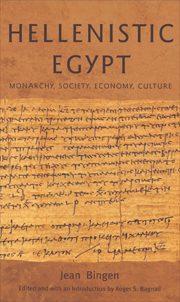Book contents
- Frontmatter
- Contents
- Original Sources of Chapters
- List of illustrations
- Glossary
- Maps
- Foreword
- Introduction: Jean Bingen and the currents of Ptolemaic history
- Part I The Monarchy
- Part II The Greeks
- Part III The Royal Economy
- Part IV Greeks and Egyptians
- 16 Greek economy and Egyptian society in the third century
- 17 Greeks and Egyptians according to PSI V 502
- 18 Graeco-Roman Egypt and the question of cultural interactions
- 19 Normality and distinctiveness in the epigraphy of Greek and Roman Egypt
- Conclusion
- Bibliography
- General index
- Index of passages discussed
- HELLENISTIC CULTURE AND SOCIETY
18 - Graeco-Roman Egypt and the question of cultural interactions
from Part IV - Greeks and Egyptians
- Frontmatter
- Contents
- Original Sources of Chapters
- List of illustrations
- Glossary
- Maps
- Foreword
- Introduction: Jean Bingen and the currents of Ptolemaic history
- Part I The Monarchy
- Part II The Greeks
- Part III The Royal Economy
- Part IV Greeks and Egyptians
- 16 Greek economy and Egyptian society in the third century
- 17 Greeks and Egyptians according to PSI V 502
- 18 Graeco-Roman Egypt and the question of cultural interactions
- 19 Normality and distinctiveness in the epigraphy of Greek and Roman Egypt
- Conclusion
- Bibliography
- General index
- Index of passages discussed
- HELLENISTIC CULTURE AND SOCIETY
Summary
This chapter originates in an impulse from the general assembly of the International Council for Philosophy and the Humanities (ICPH), held in December 1979, in New Delhi. At that gathering, Mr Conil-Lacoste, head of the Division of Studies on Cultures, presented the first results, essentially on the heuristic and methodological side, of the work pursued in his department since 1976 simultaneously by a working team, created with the hope of elaborating a programme of intercultural studies, and by a committee of coordination for those same studies. He invited each member federation of ICPH to participate in the project and to promote the various methods which might emerge from the achievements of the team.
There is no need to dwell at length on the quite different perspectives which these works opened up; but it is worth mentioning one instance, our deep-seated concern to question our own mentality in an effort to avoid an ethnocentric approach to the culture of the ‘other’ – a perennial fear in Greek papyrology, where, in front of Egyptian data, each of us is an ethnocentric Janus, a Westerner of the twentieth century and a Greek descended from Alexander. The programme also sought, more broadly, new practical approaches corresponding more tightly to the aims of UNESCO, such as identification of values that could be common to something like a general ‘human culture’, without endangering the creative specificity of each existing culture.
- Type
- Chapter
- Information
- Hellenistic EgyptMonarchy, Society, Economy, Culture, pp. 240 - 255Publisher: Edinburgh University PressPrint publication year: 2007



